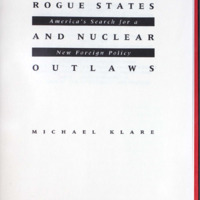-
Title
-
Rogue states and nuclear outlaws: America's search for a new foreign policy.
-
Description
-
Michael T. Klare's book is a critical analysis of Pentagon strategy in the post-Cold War era and shows how the Pentagon's planners have created a new agenda that will justify Cold War levels of spending.
-
Identifier
-
2500162
-
809082438
-
Creator
-
Klare, Michael T
-
Format
-
1st ed.
-
Source
-
Brian Lamb Booknotes Collection
-
Gift of Brian Lamb, 2011.
-
Catalog record
-
Language
-
eng
-
Date
-
1995
-
Program air date: April 30, 1995
-
Publisher
-
Hill and Wang
-
George Mason University. Libraries. Special Collections & Archives
-
Subject
-
"Nuclear weapons--Government policy--United States."
-
"Nuclear weapons--Developing countries."
-
"World politics--1989-"
-
Relation
-
Original Booknotes interview
-
Rights
-
This work may be protected by copyright laws and is provided for educational and research purposes only. Any infringing use may be subject to disciplinary action and/or civil or criminal liability as provided by law. If you believe that you are the rights-holder and object to Mason’s use of this image, please contact speccoll@gmu.edu.
-
Text
-
Transcription of Annotations
Notes on front endpaper: Military needs to explain Somalia type questions not 2 MRC typo. Crisis control establishment is what should be the focus. Bottom up review. Weapons of Mass Destruction--nonproliferation. What should we do about nuclear weapons. What was the Powell plan. What's the Rogue doctrine? Underlinings/Notes: Underlinings: $11.5 trillion for military appropriations 1947-1989. American weapons designed with Soviet capabilities in mind. 1980 Pentagon spending $143.9 billion--$294.7 billion in 1985. Composition of US armed forces by service in 1989. Powell's instructions to Joint Chiefs of Staff never made public. 1950 to 1990 US sold/gave $168 billion in arms/military equipment to Third World states. Details of increases in arms among Third World states. Proliferation of WMD. Gulf conflict test of Rogue Doctrine. Lessons: hi-tech works; air power rules battlefield; all 4 military service needed; enhanced strategic mobility essential. Military victory does not always produce political solutions; US dependent on foreign allies to carry out military plans abroad; circumstances of Operation Desert Storm were unique--dubious model for future conflicts. Notes: "General Powell,""Yr 2000, 15 nations ballistic weapons," "two enemies strategy," "DOD insures positive interpretation of Desert Storm,""White man's burden."
 2500162.pdf
2500162.pdf